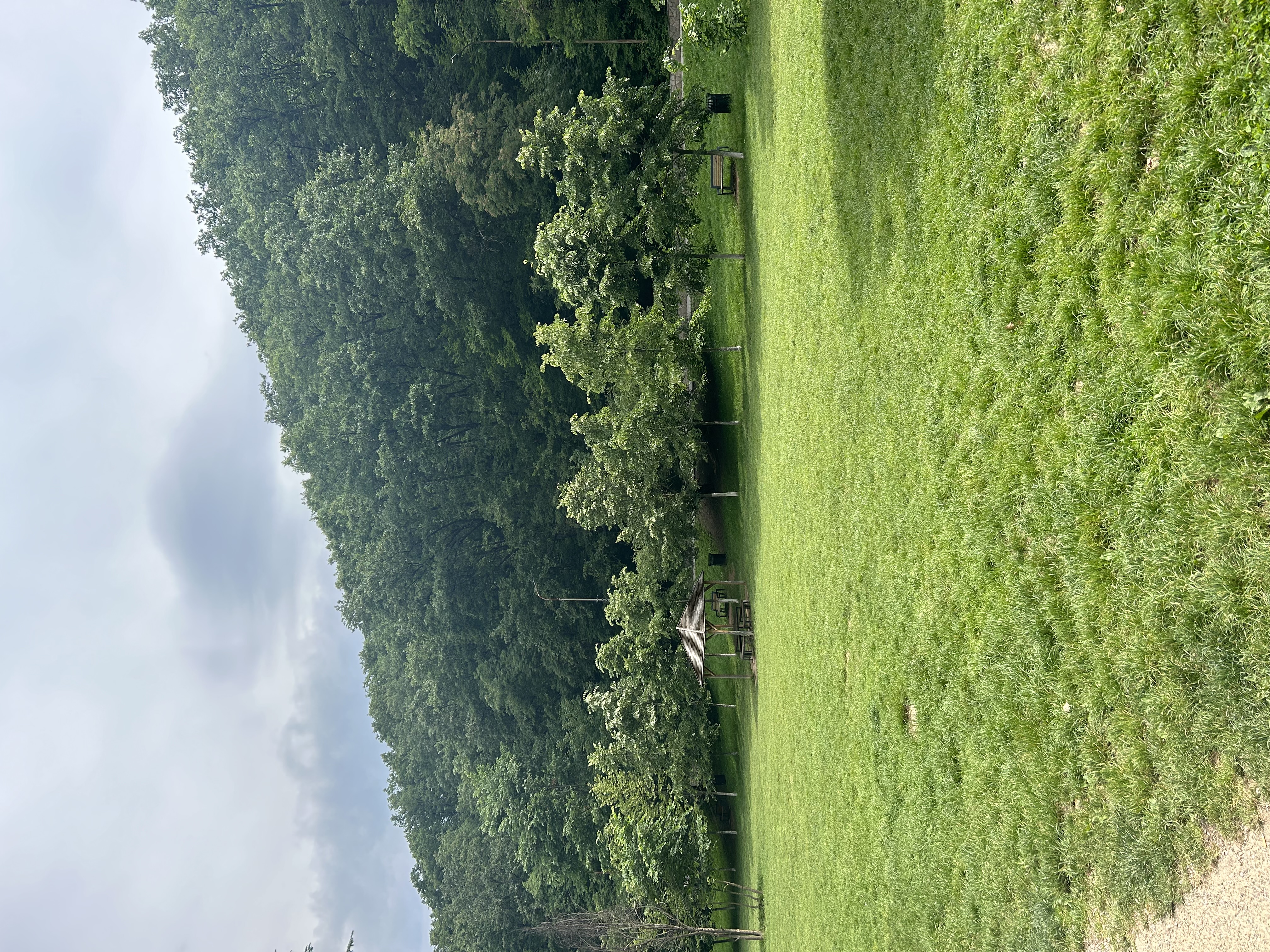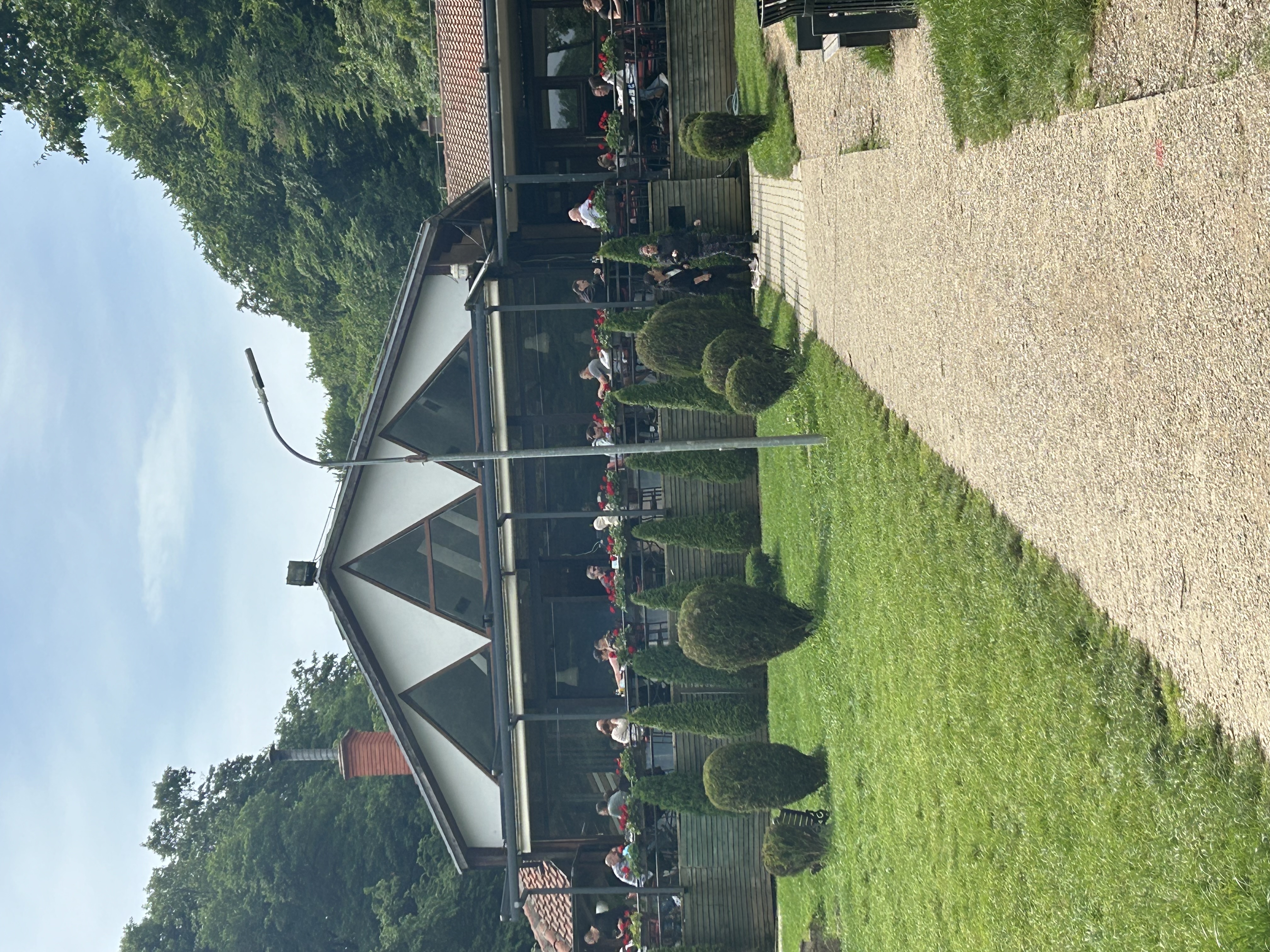Si Jeni? ("How Are You?")
Sundays are the most peaceful days in Pristina. Walking to the bus stop, Katie & I encountered exactly zero people on the street at 7 a.m. We were up early to catch the bus out to Germia Park before the European summer temperatures caught up with us. Buses are extremely convenient here. There's an app to determine arrival times and you pay the attendant onboard so no looking around for a ticket booth. If you ask the attendant to let you know when to get off for your destination, they are happy to do so. I haven't had to take the bus before, as I mentioned in another post, my walk to work is easy and pleasant in the cooler mornings. The ride gave me time to see the "old town" part of the center with Ottoman-style mosques, brick stores, and winding uphill streets. I've been so used to Pristina being flat and walkable that I was surprised how far uphill we ended up. 

Germia Park is a lush green escape from the concrete capital. It's about 24 miles of nature and part of the Rhodope Mountains. As you enter the park, you can find a large public swimming pool, tennis and basketball courts, and semi-paved trails. However, as you venture further into the park, you can start exploring the unpaved uphill trails for peak views. The Yugoslav National Army camped out in the park during the war and placed landmines around their barracks. The park was officially declared de-mined in 2013. Katie & I spent the morning on one of the paved trails to ending at Vila Germia restaurant. With an outside facade reminiscent of a ski lodge, the restaurant has a gorgeous wraparound terrace where plenty of families were having breakfast and enjoying the shade. We, of course, stopped for a mandatory macchiato. 
Cryptocurrency:
Continuing from last week's conference on Cybercrime and Cryptocurrency:
Before going into what the conference covered, a very basic and incomplete explanation of cryptocurrency may be necessary. Cryptocurrency is a decentralized digital currency created by solving complex algorithms (there are other types of digital currency created through various mechanisms) as opposed to fiat currency which is usually a centralized physical currency created and distributed by a state. Decentralization makes a currency not dependent on a state economy (which can be useful in places with hyperinflation like Venezuela, Nigeria, or El Salvador) but on the surplus and demand by the token's users. Cryptocurrency usually requires transactions be made on a third-party exchange and are accountable through public ledgers which anyone has access to. Transactions are recorded through blockchains and the public nature makes tampering with the ledger unlikely. In order to use cryptocurrency, users create a wallet with one or more public addresses (to be shared with others for payments) and a private address (for withdrawals). Addresses are a very long string a letters and numbers. A randomized list of words may also be produced as a recovery method. There are dozens of different cryptocurrencies, from the well-known Bitcoin or Ethereum to lesser known Cosmos or Arbitrum.
For the legal field, the conference first explored what types of electronic evidence police investigators should be collecting and documenting. The first challenge is to identify that cryptocurrency may be involved in their case. Is this crime primarily through the internet? If there was an exchange of funds, how and where did this take place? Do any of the victims say they paid in cryptocurrency? Identifying this possibility early allows police and prosecutors to ask for specific items in their search warrants and search for indicators of usage at crime scenes or suspects' homes. In order to seize future possible assets, investigators need to find private keys or generated word lists in order to recovery wallets.
Mixed groups of judges, prosecutors, and investigators then completed a scenario involving a social media threat to bomb a government building unless a ransom was paid. The groups were tasked with investigating the post for plausibility of the attack, finding potential suspects, determining evidence needed to prosecute specific crimes, and conducting a crime scene investigation. The Academy of Justice is especially talented at bringing different levels of the judicial system together so each level can see what the realities of the others entail. Each judge, prosecutor, and investigator was involved in each type of task from the initial threat to prosecution.
We then discussed the implications of the Silk Road investigation, the FTX criminal case, and recent February 2024 judgment against Binance for violating federal anti-money laundering and sanctions laws. Cryptocurrency exchange markets are a common way for users to buy and sell their tokens. In theory, companies are required to request and keep some client identity data. However, there was a large portion of the market that was allowing clients to submit fake passports and photographs. Binance was accused of allowing their users to submit fake credentials in order to keep their identities private if governments requested their data in criminal investigations. Binance and its CEO accepted a guilty plea including $4.8 billion in fines and forfeiture as well as an admission that it failed to report more than 10,000 suspicious transactions that involved international terrorist groups, including Hamas, al-Qaeda, and ISIS. Federal prosecutors also accused Binance of completing transactions involving child sexual material and ransonware proceeds. In light of this massive financial judgment (as well as possible jail time for its CEO), cryptocurrency exchanges have indicated they will take "know-your-customer" protocols more seriously. However, Binance's troubles have not ended there. There is a separate lawsuit by investors accusing Binance of violating U.S. securities law. Binance's attorneys allege that since the exchange is located outside of the United States that there is no applicability of U.S. securities law citing Morrison v. National Australia Bank. The Court of Appeals, however, noted that Binance denies that any jurisdiction has the authority to apply their securities law and that since U.S. servers had hosted the exchange, the investors bought the tokens in the U.S., and the tokens had value in the U.S. and therefore the lawsuit can move forward.
While the use of cryptocurrency in Kosovo is not widespread, each level of the judiciary expressed concern about the rising trend of transnational online crime and how to investigate and prosecute crimes with multiple jurisdictions, multiple nationalities of suspects and victims, and tracing anonymous payments and money laundering. The trainings conducted by the Academy and the U.S. Department of Justice help keep allies aware of the latest technologies and investigative techniques to further international cooperation as the global nature of crime expands.
Further Reading:
~ European Commission on Crypto-assets
~ European Commission 2020 Digital Finance Strategy for the EU